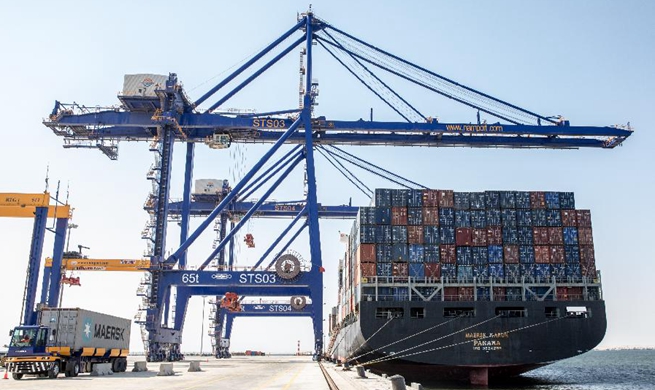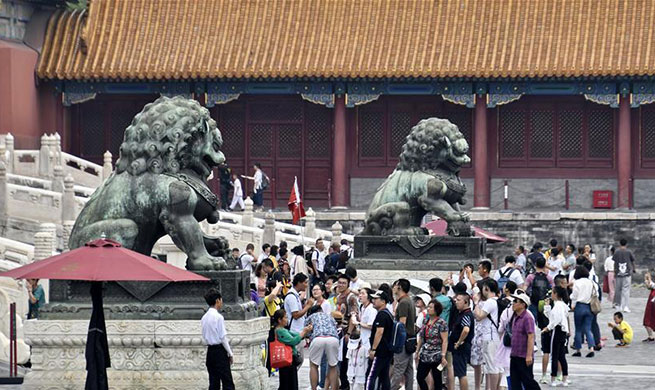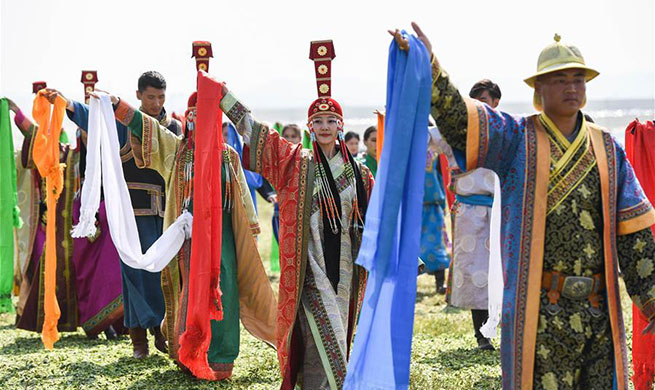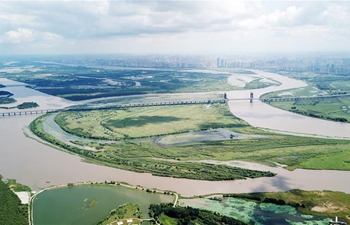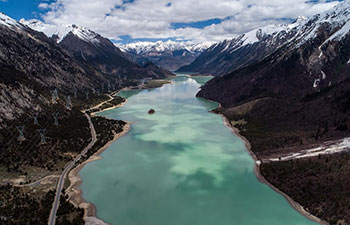ISTANBUL, Aug. 3 (Xinhua) -- As Turkey threatens a cross-border military operation against U.S.-backed Kurdish militia in Syria, chances for a Turkish intervention as well as for Ankara and Washington to compromise on a security zone are quite low, analysts told Xinhua.
"The possibility for the two countries to reach a deal (on a security zone) is near zero," maintained Haldun Solmazturk, a former general in the Turkish military.
Turkey has long negotiated, so far with no result, with the U.S. to jointly create a safe zone on the Syrian side of its border which is controlled by the Kurdish militia, the People's Protection Units (YPG).
Ankara sees a YPG-controlled area along its border as an existential threat, fearing the emergence of an autonomous Kurdish zone in Syria may set a precedent for its own nearly 20 million Kurds.
"It's not possible to reconcile Ankara's expectations about the security zone with those of Washington," argued Solmazturk, who chairs the Incek debates at the Ankara-based 21st Century Turkey Institute.
"Despite the ongoing negotiations, prospects for an agreement on the creation of a safe zone are dim," said Faruk Logoglu, a former senior diplomat.
Amid differences with Washington over the security zone, Ankara has reinforced forces along the YPG-controlled part of the border.
Turkey sees the YPG as the Syrian offshoot of the outlawed Kurdistan Workers' Party (PKK), which has been fighting for an autonomous, if not independent, Kurdistan in Turkey's predominantly Kurdish southeast.
U.S. special envoy for Syria James Jeffrey, who held talks in Ankara around ten days ago, said on Thursday that no deal on safe zone had been reached.
Turkey will move to establish the safe zone on its own in case the talks with the U.S. fail, Turkey's Foreign Ministry spokesman Hami Aksoy said on Friday.
Aksoy's warning came just as a U.S. military delegation is scheduled to arrive in the Turkish capital on Sunday for a new round of talks.
However, both analysts are skeptical about a Turkish military intervention to drive out the YPG as such a move would be highly unsustainable militarily and politically.
"I feel the probability of such an operation is less than one percent," said Solmazturk. "The Turkish military is already overstretched."
Under the so-called Astana deal with Russia and Iran, Turkey has some troops stationed in Syria's Idlib, the last major rebel bastion, to monitor a failing truce between the rebels and the Syrian army.
Following a failed coup in 2016, a total of around 17,000 officers, non-commissioned officers and enlisted personnel have been kicked out of the Turkish military for their alleged links to an organization accused of masterminding the coup attempt.
The Turkish military has also been conducting operations at home and in neighboring Iraq against the PKK.
Ankara may well feel justified to proceed on its own to establish a safe zone, but such a probability is rather dim although it cannot be ruled out altogether, remarked Logoglu.
"Without the accord of the Syrian government or a mandate from the UN Security Council, it would be hard for Turkey to maintain and sustain a safe zone," he said.
The Syrian government has strongly condemned the attempt to create a safe zone, describing the move as an assault on Syria's sovereignty.
Both analysts also underlined that a military intervention would meet with opposition not only from the United States and its coalition partners in Syria like France and Britain, but also from Russia and Iran.
The Turkey-backed Free Syrian Army (FSA) units are expected to play a significant role in a potential operation against the Kurdish militia.
"The FSA does not have the capacity to conduct an operation over such a large area," remarked Solmazturk. "Turkey's attitude is no more than saber-rattling."
The FSA fighters joined past operations of the Turkish military, in which Syria's al-Bab and Afrin regions, both near Idlib, were captured from the Islamic State and the Kurdish militia respectively.
The area the Kurdish militia controls in northeastern Syria, composed of two self-declared autonomous cantons, stretches around 450 km along the Turkish border.
A Turkish intervention would risk a confrontation with the United States as well, as the U.S. special envoy once again underlined on Thursday that Washington would protect its partner YPG against an attack.
The United States, which has over 12 military bases on the YPG-held territory, used the militia as a ground force against the Islamic State in Syria.
The Turkish and U.S. views about the security zone differ considerably.
Turkey wants the safe zone to go as deep as 32 kilometers into Kurdish-held territory and insists that it should be controlled by the Turkish military.
According to the reported U.S. proposal, the safe zone should be no bigger than 5 to 14 km in depth and in most places has a depth of only 5-6 km.
The United States does not, according to local media, agree to a full Turkish control over the zone, where the YPG militia will be made to leave.
Instead, it proposes that observation posts be put up at several places along the security zone where Turkish soldiers would serve with troops from the U.S.-led coalition forces in Syria and conduct joint patrols in the area.
The United States also reportedly suggests that people from local tribes, toward which Ankara has no hostile attitude, may have a role in maintaining security in the safe zone.
For Logoglu, the width of the proposed safe zone and the question of who should secure it are ultimately secondary details.
"The core issue is Turkey wants the zone as a protection against the YPG, whereas Washington views it as a means to protect the YPG against Turkey," he said.
Fearful that Washington may be seeking to carve out a Kurdish state in Syria, Turkey has much criticized its NATO ally for its huge supply of weapons to the YPG during the Syrian war.
Ankara also demands that the YPG forces hand over weapons when they leave the security zone.
The analysts underlined that Ankara needs to cooperate with the Syrian government, which it sees as illegitimate until now, to fight against the emergence of a Kurdish state in northeastern Syria.
"The governing guideline for Turkey must always be the preservation of Syria's sovereignty and its territorial integrity, because a stable and safe Syria is the best and enduring guarantee for Turkey's security," stated Logoglu.
A Kurdish state has de facto been established in Syria by the U.S.-led coalition and Washington is simply trying to talk Ankara into accepting it through negotiations, commented Solmazturk.
The only way out of the impasse is to start dialogue with Damascus while respecting its sovereignty and territorial integrity, he said.






